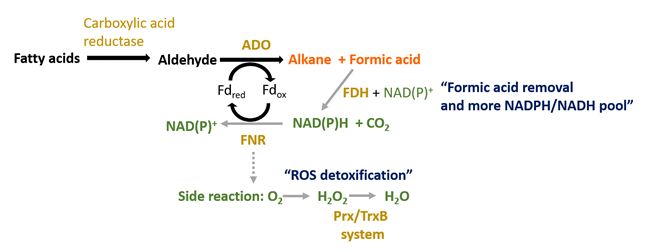Addition of formate dehydrogenase increases the production of renewable alkane from an engineered metabolic pathway

An engineered metabolic pathway to convert fatty acids to alkanes was established for producing biofuels from renewable energy sources. The aldehyde-deformylating oxygenase (ADO) functions at the last step by catalyzing the conversion of aldehydes and oxygen to yield alkanes and formic acid. The ADO also requires a cellular reductant ferredoxin (Fd) as co-substrate. In this research, enhanced alkane production yield was achieved by incorporating two auxiliary enzyme systems, (i) formic acid removal by formate dehydrogenase (FDH) reaction and (ii) ROS detoxification by Prx, peroxiredoxin and TrxB, thioredoxin reductase. This could increase bacterial alkane production to 50% conversion of fatty acids to alkanes, the highest yield reported to date.
Reference:
Jaroensuk J, Intasian P, Kiattisewee C, Munkajohnpon P, Chunthaboon P, Buttranon S, Trisrivirat D, Wongnate T, Maenpuen S, Tinikul R, Chaiyen P. Addition of formate dehydrogenase increases the production of renewable alkane from an engineered metabolic pathway. J Biol Chem. 2019 Jul 26;294(30):11536-11548. doi: 10.1074/jbc.RA119.008246.
| Relevant SDGs | |
|---|---|
 |
|
| BC investigator | |
 Asst. Prof. Ruchanok Tinikul Asst. Prof. Ruchanok Tinikul |
